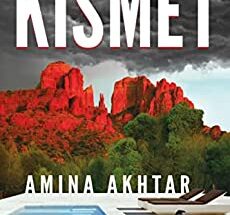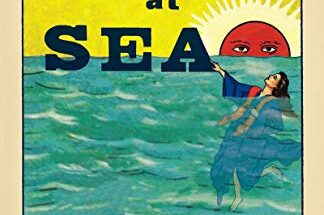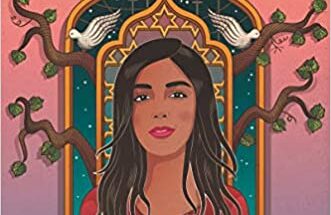 There’s a reason why Patricia Nelson receives top billing in my acknowledgments. Her editorial eye and support have been critical on the journey to publishing my debut novel, COTTONMOUTHS, out next month.
There’s a reason why Patricia Nelson receives top billing in my acknowledgments. Her editorial eye and support have been critical on the journey to publishing my debut novel, COTTONMOUTHS, out next month.
I spoke with Patricia Nelson recently about her role as a literary agent, what she looks for in submissions, the call for diversity, and more.
Patricia Nelson joined Marsal Lyon Literary Agency in 2014. She is a member of SCBWI and RWA. She received her bachelor’s degree from the College of William and Mary in 2008, and also holds a master’s degree in English Literature from the University of Southern California and a master’s degree in Gender Studies from the University of Texas at Austin. Before joining the world of publishing, she spent four years as a university-level instructor of literature and writing. Patricia is looking for middle grade and young adult fiction, women’s fiction (both upmarket and commercial), contemporary and historical adult romance, and select literary fiction. She is actively seeking diverse books and #ownvoices in all categories she represents.
What sets a manuscript out from the crowd and gives it that wow factor for you?
The first two things that I’m looking for in any project I’m considering are always:
a) Does the premise have a unique, compelling hook that will stand out in the crowded market? Can I imagine people getting excited about the story from just a quick description? If I don’t have a clear vision for selling the project, I’m not going to be the right agent for it.
b) Is the prose fantastic and do I love the voice? This is something I can usually get an inkling of within the first few pages, and in many ways is a matter of gut feeling and chemistry. My goal is to partner with authors longterm, for their whole careers, so I aim to sign writers who I think are such talented wordsmiths I know I’ll want to follow them through all different stories.
If the answer is yes to both a and b, that’s when I start to get excited about a manuscript. At that point I’m hoping to see nuanced characters that feel real and a page-turning, well-paced plot that makes me want to read straight through. If I read a manuscript in a single sitting — or if when I have to set it down I keep thinking about it — that’s generally a good sign that I’m going to leap to make an offer of representation.
Does your wish list depend on what you already represent, your current reading interests, the demands of the market, or a mixture?
All of the above. I try not to represent projects that are too similar to what I already have on my list (this is true of most agents, and here’s a great post on what “too similar” means.) I need to find projects that I think editors will want to buy, so I’m definitely taking into account what is working in the market. And when I read something I love and wish I had represented, I do find myself keeping an eye out for projects that scratch the same itch.
But that said, it’s not the case that I have specific “slots” on my list that I’m necessarily looking to fill at any given moment. Within the overarching genres I represent, mostly I’m hoping to find stories I fall completely in love with, and often those are surprises.
What do you want to see more of in the market and in your inbox?
In general, the biggest thing that I want more of across the board — in my inbox specifically and for the market generally — is diverse perspectives from underrepresented voices. But beyond that, for my most up-to-date list of what I’m looking for, you can always check out my manuscript wishlist here, and I also tweet regularly on the #mswl hashtag (those tweets are conveniently collected here).
Can you talk more about what you’re looking for with plot-driven literary fiction?
Sure! By that I mean that I don’t tend to be the right person for extremely experimental novels or very quiet character studies. I appreciate the literary value of writing that is primarily invested in pushing the boundaries of language or plumbing the psychological depths of a character, but in terms of what I personally represent, even in literary fiction, I want stakes and interesting plot things happening that make me feel like I need to keep turning the pages.
I queried you because of your call for diversity via #mswl, which was so important to me as a queer novelist and finding someone who “gets” me and my perspective. Can you talk about why that’s important to you as an agent? And what’s your take on the current call for diversity in fiction and who gets to tell the story?
Fiction has been immeasurably important in my life: in shaping how I see myself and my world, in figuring out what matters to me and how to put that into words, and in developing empathy and understanding for those who come from different contexts and backgrounds than my own. In other words, it has been both a mirror that reflected me back and helped me make sense of myself, and a window that helped me grow by seeing beyond my own limited experience.
But the system has been skewed: only some kinds of people have gotten fiction that really serves as a mirror, that resonates in their bones as deeply true to the world they know. And a lot of the windows that are out there have been badly distorted by centuries of authors — many of whom had good intentions — who wrote from outside their own experience and got it wrong. We need to fix that. And while part of that is about representing more diverse characters in a more responsible way, an even bigger part is about amplifying a wider range of voices than has been given space to be heard in the past. It’s really important, and as a publishing gatekeeper, I absolutely see it as a crucial part of my job.
How important is it for writers to self-identify in query letters when looking for an agent? Are you influenced by a writer’s background, whether it be their cultural connections, MFA or other education, their personal connection to the book topic, or the region about which they’re writing?
If there’s a part of your personal background that relates directly to the story, I definitely want to know, because it gives me a sense that you’re bringing a unique and intimate perspective to representing that identity, region, profession, etc. In terms of professional background like an MFA or publications, I like to know that too because it suggests that you’ve likely reached a certain level in terms of craft (although I certainly have clients who don’t have MFAs or previous publications, and that’s fine too).
Personally, I do also like to be told in your query if you’re a writer from an underrepresented group, because, as mentioned above, I’m strongly invested in getting a broader range of voices on the shelves. But if you’re not comfortable disclosing anything about your identity, you don’t have to and shouldn’t! It’s optional. Also, I would say that this sort of self-identification is something you might want to tweak on a query-by-query basis. If the agent you’re querying is actively out there asking for diverse books, mention it if you’re comfortable doing so. Otherwise, probably not necessary.
Before taking on my manuscript, you asked me to revise and resubmit (R&R). How often do you make these requests, and what’s your acceptance rate with such efforts? What do you think writers can learn from this type of revision effort regardless of the outcome?
Referencing back to question #1 above: if I love the premise/hook and I love the writing/voice, but I have some concerns about structure, pacing, and/or characterization, I might offer an R&R to make sure that the author is on board with the big changes I would be looking for and can execute them. Truthfully, I offer these fairly rarely because of the time it takes for me to write up my notes for the author and because I don’t want to unfairly get anyone’s hopes up — I only open the door to an R&R if I realistically expect to offer representation if the revision ends up being strong enough.
Of course, R&Rs don’t always work out (see a great, thorough explanation of why here). Ideally, if that happens, you’ll still walk away feeling like you have a better book that you can continue querying… and you got some free advice from an agent! But the possibility of an R&R not ultimately leading to representation is why you should only take an agent up on an R&R opportunity if you genuinely agree with the revision direction and believe that the changes will make your novel stronger.
Many writers believe that an agent or an editor will help with most of the heavy lifting of editing and shaping a book. That often leads to misperceptions about the extent of revision required before one submits to agents. From your knowledge of the industry, how much revision can writers expect and what advice can you give to writers about the state of their manuscript prior to submitting to agents?
It’s important to keep in mind that most agents get hundreds of queries each month, and sign relatively few clients every year in order to keep their lists to a manageable size. (For example, I signed five new clients in 2016 — out of thousands of queries.) The odds are not in your favor, so you need to make your book as strong as it possibly can be before it crosses my desk. Many agents these days are editorial agents, myself included, but that means that I put a great deal of work into polishing every project I take on to a shine — and when I’m reading a submission, I’m making a calculation between how much I love it and how much work it will take to get it to that shiny, salable level. The cleaner your manuscript is, the easier you make my decision to take it on.
You have master’s degrees in English Literature and in Gender Studies, and you have taught at the university level. How do you think your education and those experiences inform your work as an agent?
Well, first and foremost, my years of graduate school mean that I’ve read a lot, which really helped hone my taste. But also, my background in Gender Studies — and the emphasis my particular program placed on feminist and queer theory and critical race theory — has had a huge impact in shaping my priorities in terms of the kind of agent I want to be and the kind of work I want to represent. And a surprising amount of what I like about teaching — specifically, helping people think through ideas and grow their own voices and writing craft — transfers directly to agenting, which is one of the things that drew me to this job.
We’ve talked a bit in the past about writer perceptions regarding non-New York based agents, including access to editors. What myths can you dispel about that subject?
I think some writers have the perception that it’s more prestigious to be represented by a New York agent, but to be completely honest, everything in this industry happens by phone and email. As a Southern California-based agent, I also connect with editors on business trips to New York and at conferences throughout the year.
There are plenty of highly-regarded, top-selling agents and agencies all over the country. The important thing to look at when choosing an agent is what they/their agency have represented, not where the agency is located.
Along those same lines, some writers are deterred from querying agents who are newer to the industry and have fewer clients. What advice would you give on applying a more practical approach to fit for writers seeking an agent?
My advice on this is generally to query widely to a mix of agents, both newer and more established, and at bigger agencies as well as smaller boutique agencies with strong track records. You never know who will fall in love with your book — and frankly, as a debut author, you very well might be better served by an agent with a smaller list and less “big fish” taking up their time. You may be surprised at who your dream agent turns out to be once you’ve discussed your book with them and talked to that agent’s existing clients about their experiences.
Of course, that said, there are absolutely scammers out there calling themselves agents, so do your research. I strongly recommend getting a Publisher’s Marketplace subscription for at least a month while you’re making your “to-query” list, so that you can see which agents/agencies are actually selling books (and who’s selling in your genre/category, who’s making sales for debut authors, to which publishers, etc). If an agent/agency is only selling to very small publishers, they might not be a fit. Or, on the other side of the spectrum, if all their recent sales are for longstanding NYT bestsellers, they might not be as hungry to champion debut authors.
I often sing the praises of your communication skills, particularly during the harrowing submission process to editors. Many writers I’ve spoken with consider this a communication purgatory on top of the already crushing anxiety of waiting. What’s your philosophy on agent-client communication and do you vary it based on the specific client’s needs?
My take on the communication issue stems from my overarching philosophy on this is that an agent’s job is to make her clients less stressed, not more. Bad communication is stressful. Not knowing who has your book or what’s going on with your submission is stressful. And submission is an incredibly stressful time for authors to begin with! So I try to do everything I can to alleviate that, and in general I make an effort to make it clear to each of my clients that they should always feel free to reach out to me if they have any questions at all. I’m there to be my clients’ advocate, and I can only do that successfully if there’s a high level of trust and lines of communication are open.
There’s a lot of conflicting advice on the internet about the best time to query. Is there a best time? Does this vary based on the season or other factors (whether that’s due to mother nature, politics, or the ebb and flow of the publishing industry)?
This isn’t a huge deal one way or the other, and querying at the “wrong time” won’t kill your chances. If you query in August (when publishing tends to slow down and many folks go on vacation) or December (when people are likely to be out of office for the holidays), it might take you a bit longer to get a response. If you do get an offer in these months and then follow up with others considering your manuscript, you might have more agents bow out due to time constraints than in other months. But I tend to think fretting about the perfect time to query is more often than not a bit of a stalling tactic — really, you should just go ahead and query whenever your manuscript is as polished as it can possibly be.
Any last nuggets of wisdom for writers who are seeking agents?
Persistence is key in this business. If you haven’t sent 100-150 queries for a book, try more agents. If you have sent that many queries, it’s time to write the next book and then start the process over. Publishing is not for the faint of heart — there are plenty of successful authors who queried five or more manuscripts before getting an agent. And then sometimes that book that gets you the agent doesn’t sell. Or it sells, but sales aren’t as strong as the publisher hoped they would be. You just have to keep going. If a career as a writer is what you want, take steps to keep learning and improving… and keep sending your work out!




1 comment